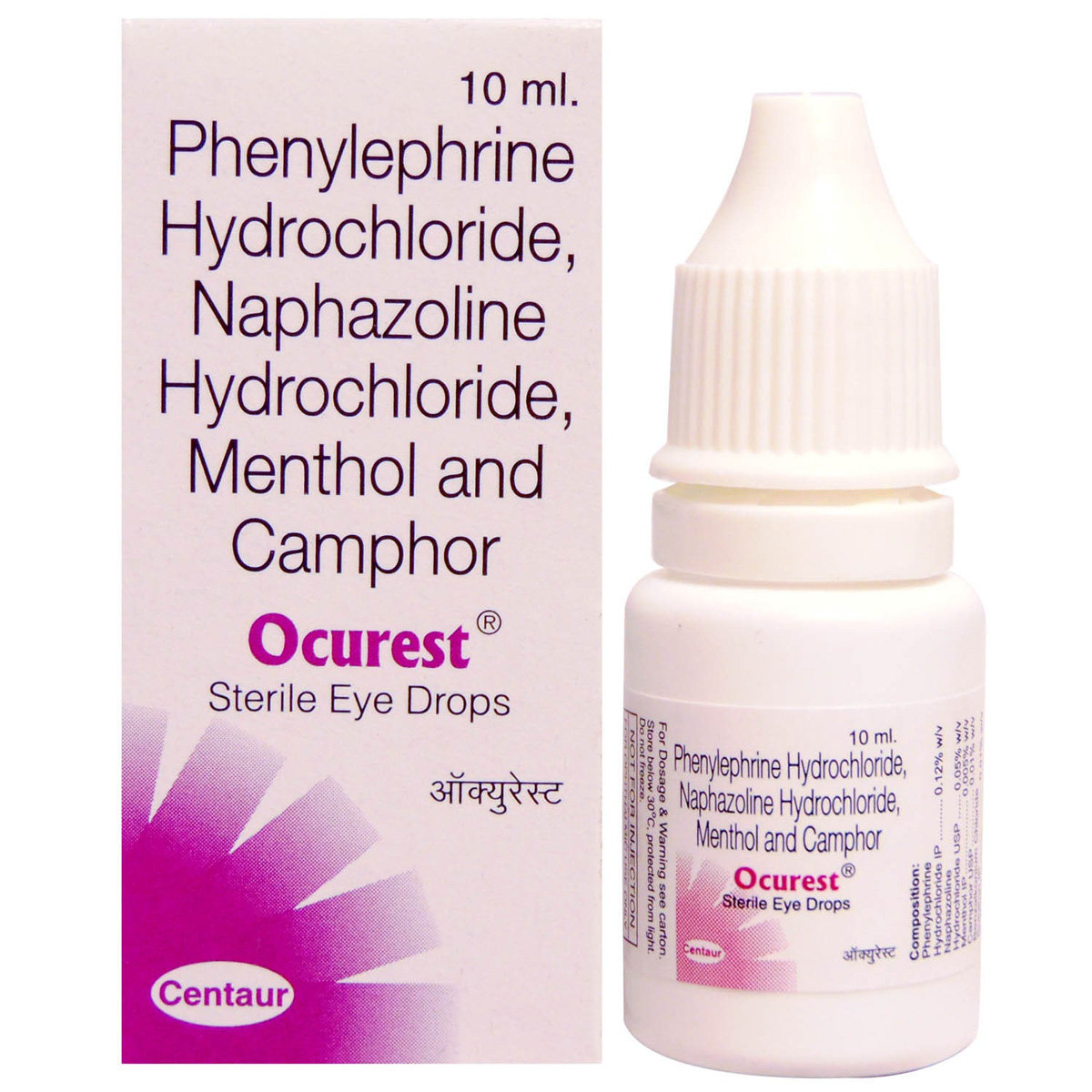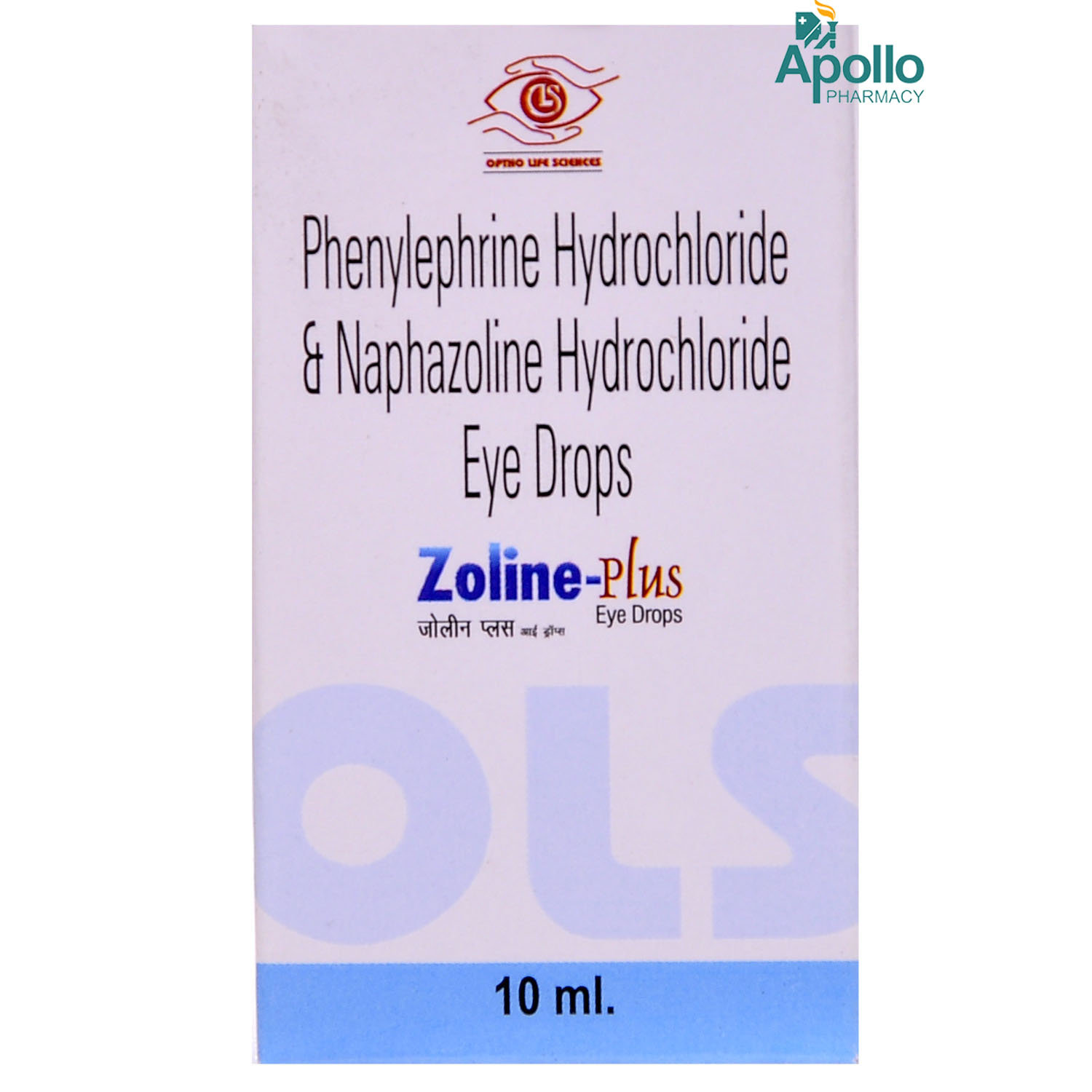Naphazoline Hydrochloride+phenylephrine Hydrochloride+camphor+menthol+benzalkonium Chloride
About Naphazoline Hydrochloride+phenylephrine Hydrochloride+camphor+menthol+benzalkonium Chloride
Benzalkonium Chloride+camphor+menthol+naphazoline Hydrochloride+phenylephrine Hydrochloride is a combination medicine indicated for providing temporary relief from congestion and discomfort associated with minor eye irritation due to dust, hay fever, smoke, cold, sun, swimming, or smog. It is used to treat allergic conjunctivitis (eye allergy), vernal conjunctivitis (swelling of the outer lining of the eyes), phlyctenular conjunctivitis (inflammation of the cornea and conjunctiva), and dry eye syndrome.
Benzalkonium Chloride+camphor+menthol+naphazoline Hydrochloride+phenylephrine Hydrochloride contains Phenylephrine hydrochloride, Naphazoline hydrochloride, Camphor, Menthol, and Benzalkonium chloride. Phenylephrine hydrochloride and naphazoline hydrochloride work by constricting/narrowing the blood vessels of the eye; this helps in providing relief from itching and irritation. Camphor and menthol help in providing a cooling sensation to the eye. Benzalkonium chloride acts as a preservative. Together, Benzalkonium Chloride+camphor+menthol+naphazoline Hydrochloride+phenylephrine Hydrochloride helps in providing relief from an eye allergy and dry eye syndrome.
Benzalkonium Chloride+camphor+menthol+naphazoline Hydrochloride+phenylephrine Hydrochloride is for ophthalmic (eye) use only. You are advised to use Benzalkonium Chloride+camphor+menthol+naphazoline Hydrochloride+phenylephrine Hydrochloride for as long as your doctor has prescribed it for you depending on your medical condition. In some cases, Benzalkonium Chloride+camphor+menthol+naphazoline Hydrochloride+phenylephrine Hydrochloride may cause certain common side-effects such as pain, irritation, blurred vision and stinging sensation. Most of these side effects do not require medical attention and will resolve gradually over time. However, you are advised to talk to your doctor if the side effects persist or worsen.
Talk to your doctor if the irritation persists despite using Benzalkonium Chloride+camphor+menthol+naphazoline Hydrochloride+phenylephrine Hydrochloride for a week or if it worsens. Consult your doctor if you are pregnant or breastfeeding. Benzalkonium Chloride+camphor+menthol+naphazoline Hydrochloride+phenylephrine Hydrochloride should not be used in children unless prescribed by the doctor. Do not touch the tip of the dropper to the eye, eyelids, and surrounding areas, as it may contaminate the solution. Inform your doctor regarding other prescription, non-prescription and herbal medicines you are taking to prevent any side effects/interactions.
Uses of Naphazoline Hydrochloride+phenylephrine Hydrochloride+camphor+menthol+benzalkonium Chloride
Medicinal Benefits
Benzalkonium Chloride+camphor+menthol+naphazoline Hydrochloride+phenylephrine Hydrochloride is indicated for providing temporary relief from congestion and discomfort associated with minor eye irritation due to dust, hay fever, smoke, cold, sun, swimming, or smog. It is used to treat allergic conjunctivitis (eye allergy), vernal conjunctivitis (swelling of the outer lining of the eyes), phlyctenular conjunctivitis (inflammation of the cornea and conjunctiva), ocular itching, redness, tearing, and dry eye syndrome. Benzalkonium Chloride+camphor+menthol+naphazoline Hydrochloride+phenylephrine Hydrochloride contains Phenylephrine hydrochloride, Naphazoline hydrochloride, Camphor, Menthol, and Benzalkonium chloride. Phenylephrine hydrochloride and naphazoline hydrochloride are decongestants that work by constricting/narrowing the blood vessels of the eye; this helps in providing relief from itching and irritation. Camphor and menthol help in providing a cooling sensation to the eye. Benzalkonium chloride acts as a preservative. Together, Benzalkonium Chloride+camphor+menthol+naphazoline Hydrochloride+phenylephrine Hydrochloride helps in providing relief from an eye allergy.
Directions for Use
Storage
Side Effects of Naphazoline Hydrochloride+phenylephrine Hydrochloride+camphor+menthol+benzalkonium Chloride
- Pain
- Irritation
- Stinging sensation
- Blurred vision
Drug Warnings
Do not use Benzalkonium Chloride+camphor+menthol+naphazoline Hydrochloride+phenylephrine Hydrochloride if you are allergic to any of its contents. Inform your doctor if you are taking monoamine oxidase inhibitors or have taken them in the last few weeks, if you have closed-angle glaucoma, high blood pressure, diabetes, eye infection or injury, hyperthyroidism, heart, kidney or liver problems. Consult your doctor if you are pregnant or breastfeeding. Benzalkonium Chloride+camphor+menthol+naphazoline Hydrochloride+phenylephrine Hydrochloride should be used in children only if prescribed by the doctor.
Drug Interactions
Drug-Drug Interactions: Inform your doctor if you are taking monoamine oxidase inhibitors (drugs used to treat depression) or beta-blockers (drugs used to treat glaucoma/ocular hypertension).
Drug-Food Interactions: No interactions found/established.
Drug-Disease Interactions: No interactions found/established.
Drug-Drug Interactions Checker List:
Safety Advice

Alcohol
cautionIt is not known whether Benzalkonium Chloride+camphor+menthol+naphazoline Hydrochloride+phenylephrine Hydrochloride interacts with alcohol. Please consult your doctor.

Pregnancy
cautionPlease consult your doctor if you have any concerns regarding this; your doctor will prescribe only if the benefits outweigh the risks.

Breast Feeding
cautionPlease consult your doctor if you have any concerns regarding this; your doctor will decide whether Benzalkonium Chloride+camphor+menthol+naphazoline Hydrochloride+phenylephrine Hydrochloride can be used by breastfeeding mothers or not.

Driving
cautionBenzalkonium Chloride+camphor+menthol+naphazoline Hydrochloride+phenylephrine Hydrochloride may temporarily blur your vision. So, avoid driving or operating machinery until your vision is clear.

Liver
cautionLimited data is available regarding the usage of Benzalkonium Chloride+camphor+menthol+naphazoline Hydrochloride+phenylephrine Hydrochloride in patients with liver impairment. Please consult your doctor.

Kidney
cautionLimited data is available regarding the usage of Benzalkonium Chloride+camphor+menthol+naphazoline Hydrochloride+phenylephrine Hydrochloride in patients with kidney impairment. Please consult your doctor.

Children
cautionBenzalkonium Chloride+camphor+menthol+naphazoline Hydrochloride+phenylephrine Hydrochloride should be used with caution in children. Benzalkonium Chloride+camphor+menthol+naphazoline Hydrochloride+phenylephrine Hydrochloride should be administered in children only if prescribed by the doctor.
Habit Forming
Diet & Lifestyle Advise
- Wash your hands regularly. Avoid touching the eyes with dirty hands.
- Avoid rubbing the eyes.
- Avoid sharing eye makeup such as eyeliner, mascara or kohl.
- Always use clean towels or tissues to wipe your eyes and face.
- Regularly wash and change the pillow cases.
- If you wear contact lens: Clean and replace contact lens more often. Never share contact lens. Always remember to wash your hands before inserting and after removing the contact lens.
- Avoid staring at digital screens for longer durations. Rest your eyes every 20 minutes.
- Blink regularly as it helps in the spread of hydrating substances such as mucus and tears across the eyes.
Patients Concern
Disease/Condition Glossary
Allergic conjunctivitis (Eye allergy): Allergic conjunctivitis, also known as eye allergy is the immune response that occurs when the eye comes in contact with an irritating substance known as an allergen. Symptoms of eye allergy include itching, burning sensation, watery eyes, red/pink eyes, scaling around the eyes, and swollen or puffy eyelids.
Dry eyes: Dry eye is a common eye condition that occurs when your tears cannot provide ample lubrication for the eyes. The tearing instability leads to inflammation and damage to the eye surface. The dry eye could be caused by disruption of the healthy tear film due to autoimmune disease, hormonal changes, or inflamed eyelid glands. Symptoms include burning sensation, sensitivity to light, eye redness, a sensation of having something in the eyes, watery eyes, and blurred vision.
FAQs
Benzalkonium Chloride+camphor+menthol+naphazoline Hydrochloride+phenylephrine Hydrochloride works by constricting/narrowing the blood vessels of the eye; this helps in providing relief from itching and irritation. It also helps in providing a cooling sensation to the eye.
To treat your condition effectually, continue using Benzalkonium Chloride+camphor+menthol+naphazoline Hydrochloride+phenylephrine Hydrochloride for as long as your doctor has prescribed it. Consult the doctor if the irritation persists or worsens despite using Benzalkonium Chloride+camphor+menthol+naphazoline Hydrochloride+phenylephrine Hydrochloride for a week.
Benzalkonium Chloride+camphor+menthol+naphazoline Hydrochloride+phenylephrine Hydrochloride might temporarily blur your vision. So, do not drive or operate machinery until your vision is clear to prevent any mishappening.
Do not wear contact lens while using Benzalkonium Chloride+camphor+menthol+naphazoline Hydrochloride+phenylephrine Hydrochloride. Remove contact lenses before using Benzalkonium Chloride+camphor+menthol+naphazoline Hydrochloride+phenylephrine Hydrochloride and reinsert after 15 minutes of using Benzalkonium Chloride+camphor+menthol+naphazoline Hydrochloride+phenylephrine Hydrochloride.
Benzalkonium Chloride+camphor+menthol+naphazoline Hydrochloride+phenylephrine Hydrochloride can be used with other eye medications if prescribed by the doctor. Maintain a gap of 10-15minutes between Benzalkonium Chloride+camphor+menthol+naphazoline Hydrochloride+phenylephrine Hydrochloride and other eye medications.
Available Medicines for
Naphazoline Hydrochloride+phenylephrine Hydrochloride+camphor+menthol+benzalkonium Chloride



